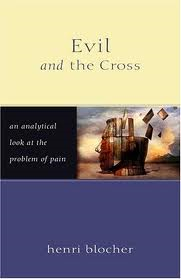 [This is a repost from 2014, because tonight I’m going to reference a quote from the lectures linked to below. And because these are really great resources if you’re wondering about either of these topics. (Come on…the Problem of Evil anyone?)]
[This is a repost from 2014, because tonight I’m going to reference a quote from the lectures linked to below. And because these are really great resources if you’re wondering about either of these topics. (Come on…the Problem of Evil anyone?)]
I want to highlight a couple of resources that are helpful if you’d like to study the bible’s teaching on evil and original sin. I discovered them a couple months ago, and, even though they are pretty dense and academic–so you might find them tough going–if you want to do a thorough, detailed study of scripture’s teachings in the area and their implications, they will repay your efforts and help you think more biblically, and more hopefully, about the problems we face in this world. They are by a French theology teacher named Henri Blocher (pronounced, I believe, “Ahn-RAY Bloo-SHAY”). The first is his book Evil and the Cross: An Analytical Look at the Problem of Pain. In this short, closely reasoned book, Blocher looks at all the different explanations which philosophers and theologians have given for evil, and how they fall short. In the final chapter he gives a look at the biblical answer. His conclusion–which is that while we may not be able to understand the origin of evil, we are shown its final end–is summed up nicely in this paragraph from the book:
“Evil is conquered as evil because God turns it back upon itself. He makes the supreme crime, the murder of the only righteous person, the very operation that abolishes sin. The maneuver is utterly unprecedented. No more complete victory could be imagined. God responds in the indirect way that is perfectly suited to the ambiguity of evil. He entraps the deceiver in his own wiles. Evil, like a judoist [a Judo fighter], takes advantage of the power of good, which it perverts; the Lord, like a supreme champion, replies by using the very grip of the opponent. So is fulfilled the surprising verse; ‘With the pure you show yourself pure; and with the crooked you show yourself perverse.’”
The biblical cry about evil, he says, turns from “Why, God?” to “How long, O Lord?”–and it is there we find the hope he offers.
Secondly, here are links to five lectures Blocher did on the Christian doctrine of Original Sin. These are academic (and he has a thick French accent) so they may be tough going at times, but he really does a good job of opening up the Bible’s teaching on the subject. Let me know if you find these helpful!
- Lecture #1 – Original Sin as Taught in Holy Scripture
- Lecture #2 – Original Sin as Adamic Event
- Lecture #3 – Discerning Paul’s Mind on Adam’s Role
- Lecture #4 – Original Sin as a Key to Human Experience
- Lecture #5 – Original Sin as Propagated and Broken
